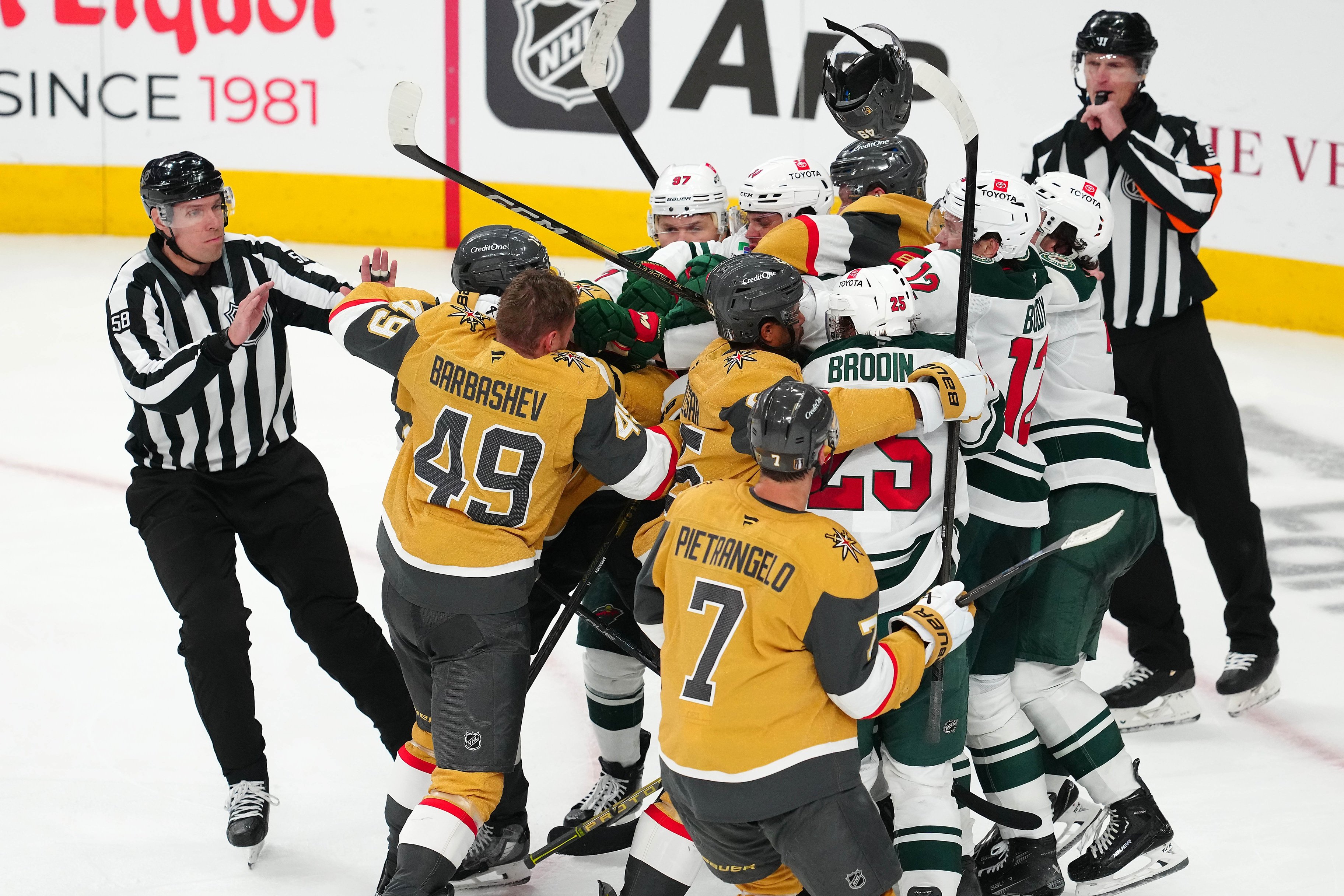
This season, the Minnesota Wild implemented a successful tactic to lower their shorthanded goals against.
Don’t take penalties.
The Wild ended this season ranked 30th overall for penalty kill, with a 72.4% success rate. However, they only have 612 penalties in minutes (PIM), compared to the Florida Panthers, who have the most with 843. Minnesota doesn't have the same experience playing short a man as other teams, nor are they as physical.
Considering Ryan Hartman and Marcus Foligno have 75 PIM each, it might be their teammates’ personality or a conscious effort that keeps Minnesota out of the box. The Vegas Golden Knights are only slightly better at the PK, with 75.7% overall in the regular season. Unfortunately, they're one of the few teams even better at staying out of the box, with only 463 minutes this season. They also rank 2nd in power plays, with 28.3%.
Both teams have maintained their discipline in the postseason and only took 24 and 18 penalties, respectively. Unfortunately, there is no award for the most well-behaved. Whichever team moves on to the next round will definitely have to be more physical, and hope they don't face the Winnipeg Jets or the St. Louis Blues. Both Central Division teams are looking to draw blood, with 140 and 108 minutes, respectively, in the past 4 games.
If the Wild had a better penalty kill, I’d recommend they spend a few more minutes in the sin bin to match other teams. Penalties are usually a strong indicator of physicality. While physicality makes a team much more difficult to play against, it doesn’t necessarily equate to success.
In the 2023-24 season, the Anaheim Ducks and the Florida Panthers had over 1100 minutes. The Ducks ranked 30th by the end of the season, and the Panthers took home the Cup. As it stands, roughing up the other team is not a strategy Minnesota can adopt anytime soon. If they make it further, it’ll be a whole new battle. The Knights’ skill level makes them a formidable opponent, but they aren’t as physical as other playoff teams.
However, the Wild have wisely been disciplined in the Vegas series. In Game 1, Matt Boldy couldn’t catch William Karlsson, who had the puck going towards Minnesota’s empty net. Boldly purposefully tripped Karlsson, and drew the penalty, but almost certainly stopped a goal.
There’s only one penalty the Wild shouldn’t have gotten: having too many men on Saturday. Brock Faber was the third defenseman on the ice and quickly noticed and got back off, but since Minnesota made a pass in the seconds he was on, they got whistled for it.
Line changes can be more complicated than they look. Teams have set lines, but the bench is loud and busy, and the changes happen very fast. Lines can quickly get jumbled if a player comes off early or the coach decides to switch players at the last second. Still, they’re professionals who can count to 5. However, this mistake wasn’t necessarily on Faber since it could’ve been another player who wasn’t supposed to be out. In any case, too many men should be an easily avoidable mistake.
Minnesota can be less physical and play a perfect game, but it could still draw penalties. Professional refs can be biased and make mistakes. While the Wild have committed their alleged crimes, there has been a lack of calls on Vegas.
Nick Hague fully cross-checked Ryan Hartman in the face, and there was no call. Hartman tripped Hague and pushed him, but with the intent to get the puck. Hague’s cross-check was blatant and unsportsmanlike. Call me biased, but there is a difference. Minnesota, and specifically Hartman, showed discipline and did not retaliate further.
Robert Hagg tripping Freddy Gaudreau off the faceoff, immediately followed by a Vegas goal, was definitely more egregious.
The Wild has controlled what they could, despite imperfect circumstances. The only place to improve is the penalty kill itself. Minnesota is 63.6% on the kill so far, but has been inconsistent game to game. In Game 1, the Knights scored on both their power plays, but the Wild didn’t show a massive weakness in their kill.
During the Knights' first power play, Shea Theodore faked a shot on net but passed to Pavel Dorofeyev. Dorofeyev took a one-timer and slapped the puck in before Foligno or Filip Gustavsson had time to move over.
Vegas’s skills, rather than Minnesota’s mistakes, made this goal happen. However, the Wild should take note of this play for future PKs.
Minnesota didn’t take a single penalty in Game 2, and they successfully killed all 4 of their penalties in Game 3.
However, the Wild were off their game in Game 3. Before the Knights’ first PPG, they were already peppering Gustavsson with shots. There was a loose puck, and Foligno had his stick on it, but Riley Smith outmuscled him and took it. Smith then passes to Theodore, who scored.
On the penalty kill, Minnesota must summon the superhuman strength usually reserved for life-threatening situations, not get outmuscled. Las Vegas’s second PPG was equally disappointing.
Again, the Knights already had several shots on net before they scored. The puck popped out from a rebound, and Boldy swung at it but never made contact. Nicolas Roy picked it up and scored.
Even pros whiff occasionally, but they shouldn’t in the playoffs.
Minnesota’s strategy of staying out of the box worked well in the regular season, despite its struggles on the penalty kill. However, Las Vegas is even more disciplined at staying out of the box and far more lethal on the power play.
The Wild can’t avoid every penalty, so they’ll have to make the extra effort on the penalty kill to gain an edge over the Knights. However, if Minnesota makes it past the first round, they will likely be up against much more physical teams and may need to change strategies again.
Think you could write a story like this? Hockey Wilderness wants you to develop your voice, find an audience, and we'll pay you to do it. Just fill out this form.
-
 1
1







Recommended Comments
Join the conversation
You can post now and register later. If you have an account, sign in now to post with your account.
Note: Your post will require moderator approval before it will be visible.